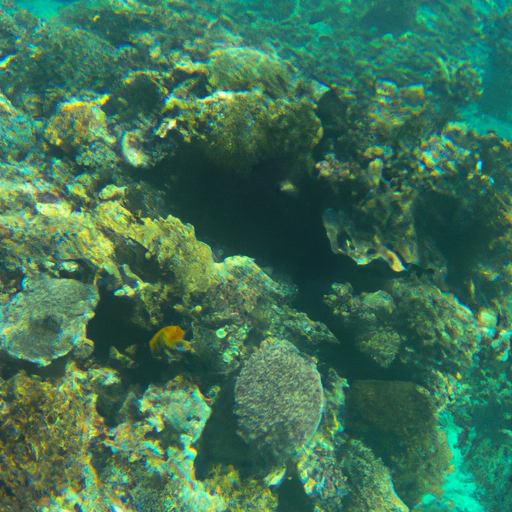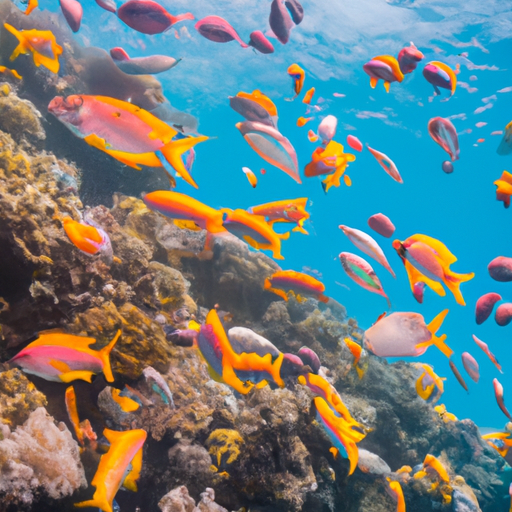
The Importance of Coral Reefs: Exploring the Secretive yet Vital Ecosystems Underwater
The world beneath the surface of our oceans is a vast, mesmerizing, and mysterious place. Hidden within its depths lie some of the most vital ecosystems on Earth – coral reefs. These underwater marvels are not only breathtakingly beautiful, but they also play a crucial role in maintaining marine biodiversity and supporting countless species of plants and animals. Unfortunately, coral reefs face numerous threats, including climate change, pollution, and overfishing, which highlight the urgent need to uncover their hidden secrets and understand their complex ecosystems.
Coral reefs are made up of millions of tiny organisms called polyps, which build intricate structures using calcium carbonate. These structures, known as coral colonies, provide a habitat for a diverse range of marine life, including fish, invertebrates, and even smaller microorganisms. The interdependence between different species within coral reefs is astonishing, with each one relying on the other for survival. For example, some fish species rely on the protection provided by the coral colonies, while the coral itself benefits from the tiny algae living within its tissues, which provide it with essential nutrients through photosynthesis.
Exploring the secrets of coral reefs requires a multidisciplinary approach, involving scientists from various fields such as biology, ecology, and marine geology. By studying these ecosystems, researchers can uncover valuable information about their biodiversity, reproduction, and ability to adapt to changing environments. This knowledge is crucial for developing effective conservation strategies and mitigating the threats that coral reefs face.
One of the most notable aspects of coral reefs is their sheer biodiversity. Despite only covering a small fraction of the ocean, coral reefs are home to a quarter of all marine species, making them one of the most diverse ecosystems on the planet. This incredible richness of life provides numerous benefits, including the discovery of new drugs, as many marine organisms found in coral reefs have shown potential in the development of medicines to treat various diseases.
Furthermore, coral reefs act as natural barriers, protecting coastlines from erosion and storm damage. Their complex structures absorb and dissipate wave energy, reducing the impact of storms on nearby shores. In this way, coral reefs provide a valuable ecosystem service to coastal communities, which makes their preservation even more vital.
Despite their importance, coral reefs are facing unprecedented challenges. Rising sea temperatures, ocean acidification, and pollution from human activities are causing widespread coral bleaching events and the death of entire reef systems. Overfishing further disrupts the delicate balance within these ecosystems, affecting the abundance of fish species and the overall health of the reef. Urgent action is needed to address these threats and protect coral reefs for future generations.
In conclusion, coral reefs are not only breathtakingly beautiful but also house a complex web of life that is vital for the health of our oceans. Uncovering the hidden secrets of these ecosystems is crucial for understanding their importance, developing conservation strategies, and mitigating the threats they face. Protecting coral reefs is not just important for the millions of species that call them home, but also for the countless benefits they provide to humans. By appreciating their beauty and value, we can work towards a sustainable future where coral reefs can thrive.
Unveiling the Mysteries of Coral Reefs: Delving into the Intricate Interactions of Marine Life
Coral reefs are some of the most diverse and complex ecosystems on our planet. Spanning over 280,000 square kilometers, these underwater wonders are home to a plethora of marine life, from tiny organisms like plankton to large predators like sharks. Within these vibrant ecosystems, there lies a hidden world filled with secrets waiting to be unveiled.
One of the most intriguing aspects of coral reefs is their intricate interactions between different species. These interactions play a crucial role in maintaining the delicate balance of the ecosystem. For instance, the relationship between coral polyps and zooxanthellae, a type of algae, is vital for the survival of both organisms. The coral provides a safe habitat for the zooxanthellae, while the algae supply the coral with essential nutrients through photosynthesis.
Furthermore, coral reefs also serve as nursery grounds for countless marine species. Juvenile fish often seek shelter and food within the intricate structure of coral, finding protection from larger predators. This symbiotic relationship not only benefits the young fish but also helps maintain the overall health and diversity of the reef ecosystem.
But the complexity of coral reefs doesn’t end there. These underwater marvels are also heavily influenced by environmental factors such as water temperature, salinity, and nutrient levels. Climate change and human activities, such as pollution and overfishing, pose significant threats to coral reefs worldwide, disrupting the delicate balance and causing irreparable damage to these ecosystems.
Scientists and researchers are constantly working to uncover the hidden secrets of coral reefs. They utilize advanced technologies like remote sensing, underwater drones, and genetic analysis to study and understand the intricate dynamics of these ecosystems. By deciphering the complexity of coral reefs, scientists hope to find solutions to protect and preserve these fragile ecosystems for future generations.
In conclusion, coral reefs are not just beautiful underwater landscapes; they are complex and delicate ecosystems teeming with life. Uncovering the hidden secrets of coral reefs requires a deep understanding of the intricate interactions among various species and the environmental factors that shape these ecosystems. By shedding light on these mysteries, we can work towards conserving these vital habitats and ensuring their longevity.
The Hidden Wonders of Coral Reefs: A Closer Look at the Breathtaking Biodiversity Beneath the Waves
Coral reefs are often referred to as the “rainforests of the sea,” and for good reason. These remarkable ecosystems, found beneath the waves of our planet’s oceans, are teeming with an incredible diversity of marine life. From vibrant corals to an array of colorful fish, exploring coral reefs is like entering a whole new world that is both mesmerizing and awe-inspiring.
However, the true beauty and complexity of coral reefs go far beyond what meets the eye. Beneath their stunning exterior lies a hidden world filled with secrets waiting to be uncovered. Scientists and researchers are working tirelessly to unlock the mysteries of these underwater wonders, and their discoveries continuously reshape our understanding of these unique ecosystems.
One of the key aspects of coral reefs that researchers are focused on is their role as complex ecosystems. Coral reefs support a myriad of interconnected organisms, ranging from microscopic plankton to large predatory fish. Each species plays a crucial role in maintaining the delicate balance of the ecosystem.
One fascinating aspect of coral reef ecosystems is their incredible biodiversity. Coral reefs are home to an estimated 25% of all marine species, despite covering less than 1% of the ocean’s surface. This astonishing level of biodiversity is unparalleled in any other marine environment. Exploring coral reefs allows researchers to encounter species found nowhere else on Earth and witness the intricate relationships between different organisms.
Furthermore, coral reefs act as natural nurseries for many marine species. The complex structure of the reef provides shelter for juvenile fish and other organisms, offering protection from predators. As these young organisms grow and mature, they contribute to the overall biodiversity and health of the reef ecosystem.
However, coral reefs are facing numerous threats that endanger their existence and the invaluable biodiversity they harbor. Climate change, pollution, overfishing, and destructive fishing practices are just a few of the factors contributing to the degradation of coral reef ecosystems worldwide. Understanding the hidden secrets of coral reefs is not only a matter of scientific curiosity; it is also crucial for developing effective conservation strategies to protect these delicate ecosystems for future generations.
In conclusion, coral reefs are more than just stunning underwater landscapes. They are intricate and complex ecosystems that harbor a wealth of biodiversity, which remains largely hidden from our view. Uncovering the secrets of coral reefs is an ongoing endeavor that requires a deep understanding of the connections between different organisms and the environmental factors that shape these ecosystems. By studying and conserving these hidden wonders, we can ensure the preservation of their breathtaking beauty and the vital services they provide for our planet.
From Fragile Beauty to Global Significance: Understanding the Complexity of Coral Reefs and Their Role in the Environment
Coral reefs are often referred to as the “rainforests of the sea” due to their incredible biodiversity and importance in the marine ecosystem. These mesmerizing underwater structures are not just aesthetically pleasing, but also play a vital role in our environment. Uncovering the hidden secrets of coral reefs reveals a complex ecosystem teeming with life and interconnected relationships.
At first glance, coral reefs may appear as fragile and delicate structures, but they are much more resilient than they seem. Composed of millions of tiny coral polyps, which are small marine animals, corals form intricate structures over time. These structures provide shelter, food, and breeding grounds for a wide range of marine species.
Research has shown that coral reefs support over 25% of all marine life, despite covering less than 1% of the ocean floor. This astonishing level of biodiversity is due to the interdependence and symbiotic relationships between various marine organisms. For example, many fish species rely on coral reefs for protection from predators, while also providing essential nutrients through their waste. In return, the fish help maintain the health of the coral by consuming algae that can harm the reefs.
Coral reefs also act as natural barriers along coastlines, protecting them from erosion caused by waves and storms. The complex structures of reefs dissipate wave energy, reducing the impact on the shore. This ecosystem service is crucial for coastal communities, as it helps mitigate the effects of climate change and sea-level rise.
Moreover, coral reefs provide significant economic benefits to millions of people worldwide. They support tourism industries, attracting visitors who want to witness the breathtaking beauty of these underwater ecosystems. The revenue generated from reef-based tourism helps fund conservation efforts and provides livelihoods for local communities.
Despite their importance and ecological value, coral reefs face numerous threats, including climate change, ocean acidification, overfishing, and pollution. These stressors can lead to coral bleaching, a phenomenon where corals expel their symbiotic algae, causing them to turn white and become susceptible to disease and death.
Preserving and understanding the complexity of coral reefs is essential for the health of our oceans and the well-being of countless marine species. Ongoing research and conservation efforts are crucial in uncovering the hidden secrets of these underwater wonders and fostering their resilience in the face of global challenges.
In conclusion, coral reefs are not just beautiful underwater formations; they are intricate ecosystems that support a wide range of marine life. From their role in providing habitats and food sources to acting as natural protective barriers, coral reefs play a vital role in the environment. Understanding and protecting these complex ecosystems is crucial for the well-being of our oceans and the global significance of coral reefs.



